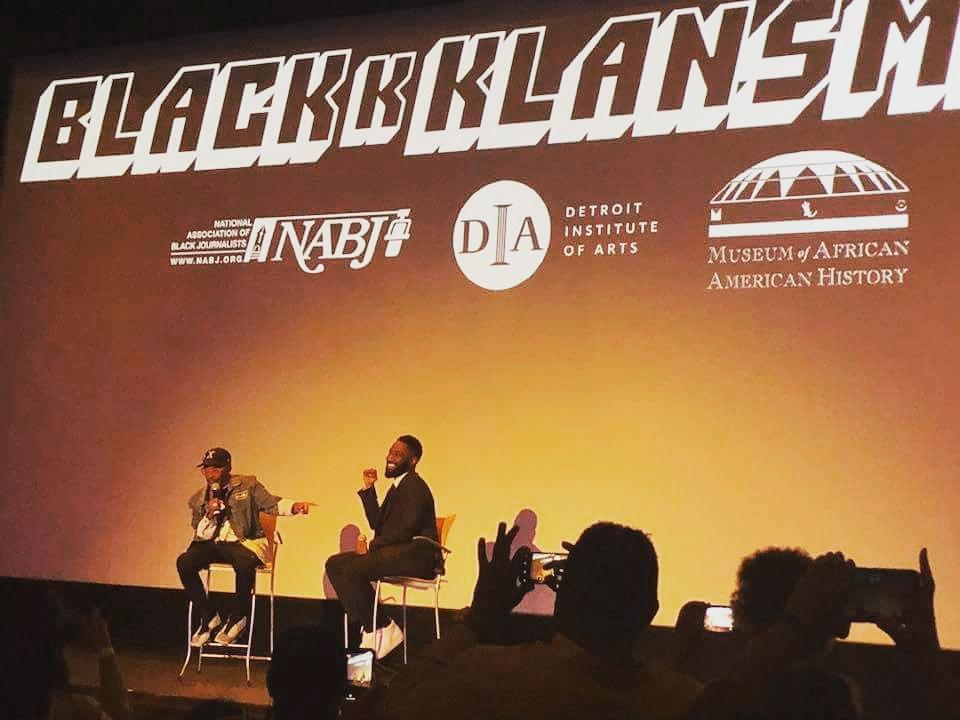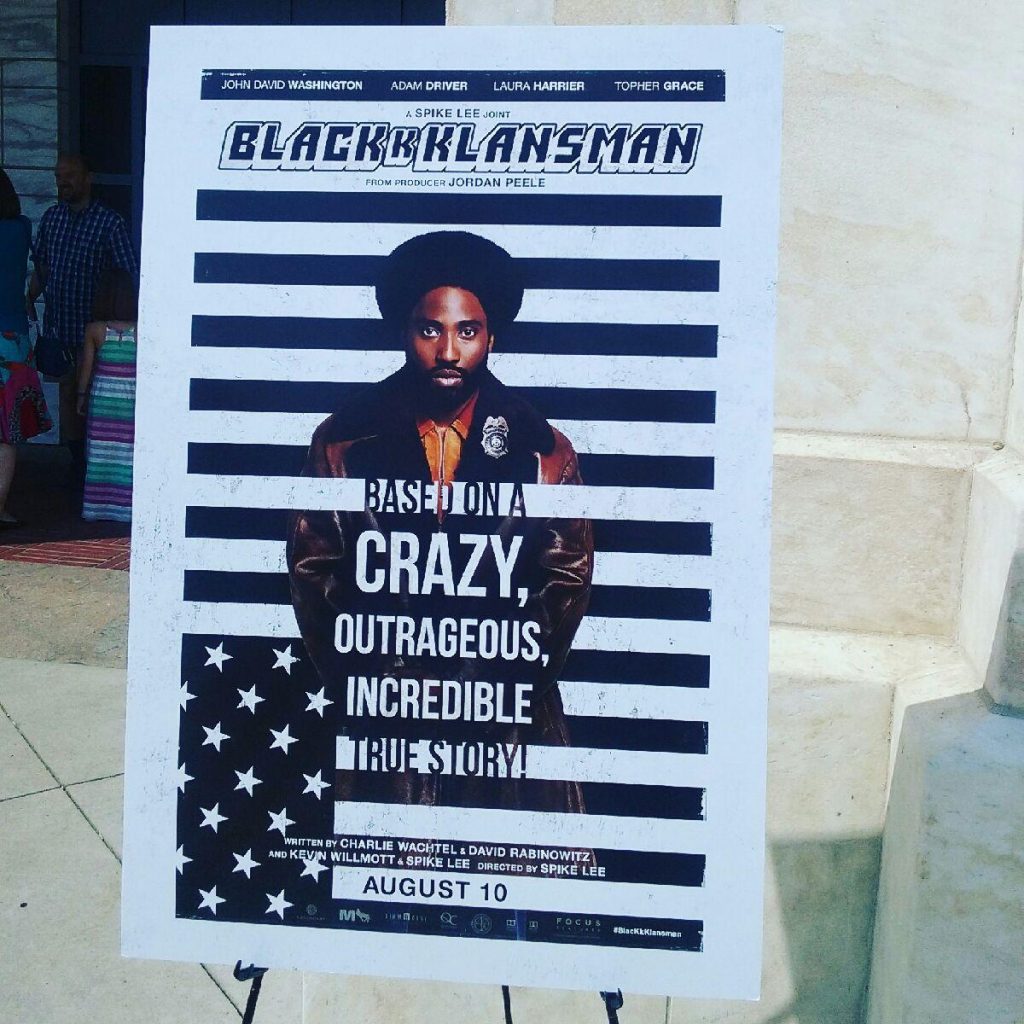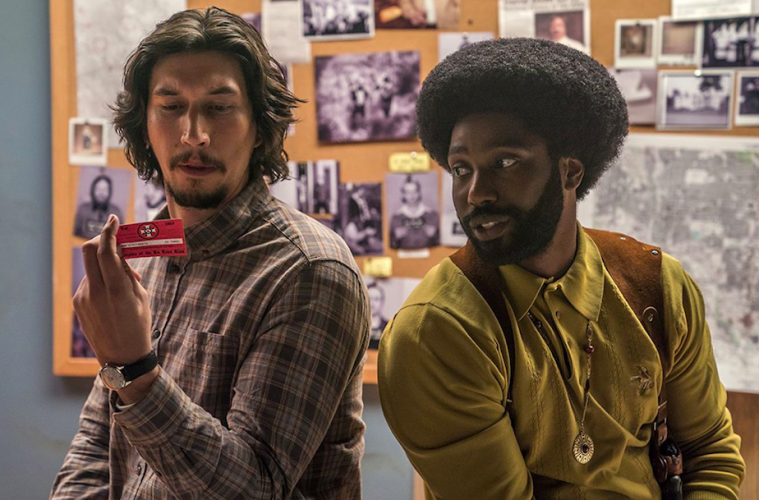Master marketeer Spike Lee was center stage this past Saturday as he brought his soon to be released Blackkklansman (August 10th) to “Dee troit”, as the filmmaker called our beloved town upon his introduction.
Spike smartly held the serendipitous screening for a receptive audience of special invitees, which included hundreds of journalists and media types uniting in our fair city during the NABJ (National Association of Black Journalists) convention. And, he actually watched the film with the audience, which you do not always see.
To be truthful, impartiality and objectivity are impossible for me as a viewer/critic when it comes to Spike Lee’s work. My development in the film business is directly due to Spike’s influential early films and my opportunity to learn as an intern and production assistant on films like Crooklyn and Clockers makes me biased like a mofo.
Spike displayed and disclosed to so many of us, a path. Thus, I am indebted to the man.

Spike Lee discusses Blackkklansman with actor John David Washington at the DFT
Built in 1927, the glorious Detroit Film Theater (DFT) @ the Detroit Institute of Arts (DIA) set the stage for a Q&A session with Spike and the film’s star, John David Washington, following the successful screening.
Commenting on a wide-range of audience fired questions, Spike divulged a host of tidbits about his film, the film biz, and present day society, as only Spike can.
Eloquent, in his always humorous NY vernacular, and understandably jovial after the well received screening, Spike spoke on the continued need for diversity in “Hollywood Gatekeepers” to allow black oriented works to flourish; called for a need for black unity and his respect for the activism of today’s youth; gave solemn praises to the white freedom fighter Heather Heyer for her dear sacrifice in the cause of equality; and told how the actions of the alt-right on the night of August 11, 2017 and the days that followed, including the actions of “Agent Orange” (Spike said he refuses to say the 45th POTUS’ name), helped rewrite the film’s original to the final ending.
Spike said he had no idea about the fact based story of Ron Stallworth when Jordan Peele called him “out of the blue” to gauge Lee’s interest in directing – Stallworth’s little known original novel about the events is being republished – perhaps, paying it forward to Spike; something Lee has done his entire career for other filmmakers (See New Jersey Drive, DROP Squad, Confederate States of America, Pariah, to name a few). Once he knew that it was indeed true, and after getting over what he admits was an immediate thought of the David Chappelle skit on a Black Klansman, Spike was on board.

Film poster at the DFT screening
Blackkklansman, as the poster bellows, is “Based on a crazy, outrageous, incredible, true story!”, which if were not historically factual would be nearly impossible to believe.
Set in the early 1970s, the biographical saga deals with American and sociological themes and issues worthy of study both then and now – material tailor-made for writer-director Spike Lee.
While the film never directly provides the exact year, visual background indicates a 1972-74 timeframe. It’s period, characters, and themes allow a synergy much like 25th Hour.
Clearly, Inside Man is first-rate work, but not since 25th Hour has Spike hit on all cylinders in his ability to capture variant dramatic tones, as seen in the procedural drama (with wonderful comedic moments) of Ron Stallworth (John David Washington), the first African-American to integrate the Colorado Springs police department.
With integration being a vital concern throughout the public sector in America at that time, Chief Bridges (Robert John Burke) fairly warns eager Stallworth during an interview, if he is ready to take the heat and up to the task of being the first “Jackie Robinson” on the force.
During a powerhouse Kwame Toure/Stokely Carmichael (Corey Hawkins) speech, Ron begins to understand the conflict of conscience/cognitive dissonance that being an undercover cop can present for a thinking man like himself. Fate and destiny grant Ron an ability to find a crusade and mission, and means to achieve effectiveness within the system. In this case, become a member of the Ku Klux Klan and gathering intel on any criminal activity.
As the investigation progresses, the sheer audacity, zaniness, and harrowing tonal shifts send the viewer through all ranges of emotions – horror, indignation, pride, laughs – which as a lover of movies is truly exciting (and, what Spike’s best work often exhibits).
The requisite romance is easy to root for, as the attractive Black Student Union President Patrice (Laura Harrier) is courted by the smitten Ron. Even though they are from somewhat counterpoint social groups/entities the couple is united by pro-black ideology, so the romance feels naturally ingrained rather than forced.
With a mostly supportive undercover team and superiors (not that CSPD doesn’t have its bad apples, as the film shows), Flip Zimmerman (Adam Driver), who experiences his own inner conflict about his Jewish roots, becomes the alter ego for Ron as the investigation leads to a slew of unsavory types within the Klan, or “organization” as Flip/Ron is taught.
Anchored by stellar performances from the distrusting Felix (Jasper Pääkkönen), to the domestic housewife, fully committed to the Aryan cause (Ashlie Atkinson), the investigation serendipitously leads straight to party leadership, David Duke (Topher Grace) – a man with a long history of hatred (that continues today) fascinatingly portrayed in his younger days. While it may be hard for some younger audiences to truly understand the chameleon history of this man his comeuppance is fun to watch (check out the Lee executive-produced film Tales from the Hood and ‘KKK Comeuppance’).
Spike’s well-known issues of being heavy-handed, didactic, and melodramatic, pop up here, as does his slightly too long running times. But fuggedaboutit. The material allows Lee his visual and experimental flourishes, such as the film’s lively opening sequence, featuring Alec Baldwin in a powerhouse cameo, and the photo montage trio of faces during the Toure speech. Finally, Lee uses intertextuality in two ways: Through a riveting expose and attack on D.W. Griffith’s Birth of A Nation (under the guise of a “fun” screening) and during the film’s final images and ending, which bring to mind the Rodney King video in Malcolm X.
Though the story is set in the 70s, Spike mentioned how he and screenwriter Kevin Willmott were committed to connect the work to topical and contemporary issues of our present day. Never a direct attack on the 45th POTUS, Lee is nevertheless able to tie Trump into the story’s themes and wider contexts.
Of aesthetic and technical note, Spike worked with new collaborator DP Chayse Irvin and captured the movie on film stock (35mm and 16mm). Look for what I see as a homage to Citizen Kane during the Kwame Toure speech scene.
Awarded the Grand Prix at Cannes Film Festival in May Blackkklansman is poised for a well-deserved box-office and continued critical acclaim. As Spike can certainly appreciate the sports metaphor, he has “hit a home run” with this one.
Bravo, Spike. Bravo.
A philosopher with a camera, a Mont Blanc, and a laptop. Taught by the likes of Godard, Eisenstein, Welles, Scorsese and Lee, Julian Boyance is a filmmaker/blogger/film instructor hailing from Metro Detroit, whose cinematic journey traverses both academia, production, and beyond. Facebook administrator for the Nicolas Winding Refn Appreciation Society fan page, his social media footprint can be found here: Twitter/Instagram: @godardfan Youtube: Godardfan Tumblr: Godardfanforever

